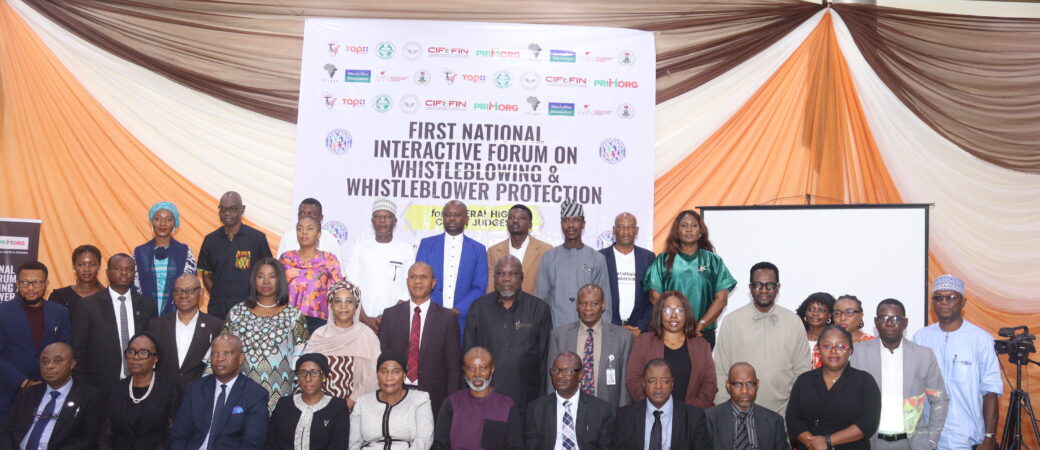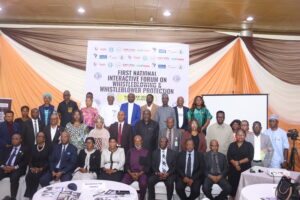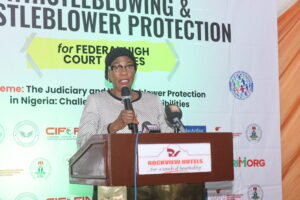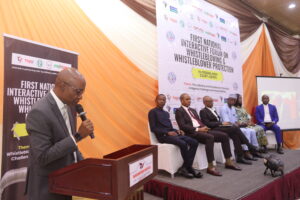
On Thursday, September 18, 2025, the African Centre for Media and Information Literacy (AFRICMIL) in partnership with National Human Rights Commission (NHRC) and Tap iNitiative convened the first National Interactive Forum on Whistleblowing and Whistle blower Protection for Federal High Court Judges. Themed “The Judiciary and Whistle blower Protection in Nigeria: Challenges and Responsibilities”.
The forum brought together Federal High Court judges, Anti-Corruption agency, legal scholars, CSOs and other partners to discuss prompt passage of the long-delayed Whistle blower Protection Bill into law to guarantee adequate protection for whistle blowers in the country and also the pivotal role of the judiciary in safeguarding whistle blower in advancing transparency and reinforcing accountability within the Judicial Processes
Dorcas Agishi, representing the Chief Judge, stressed that while the whistle blower’s policy is strong, judges need clear legal authority to act. “We understand what you desire us to do. Since it is a policy, it will be difficult for us to do what we need to do.”
She pointed out that judges use the law as a tool. She, therefore, called for engage ment with the legislature and the executive arm of government as well as other relevant stakeholders to expedite the passage of the whistle blower into law and for law enforcement officers to perform their responsibilities properly.
ment with the legislature and the executive arm of government as well as other relevant stakeholders to expedite the passage of the whistle blower into law and for law enforcement officers to perform their responsibilities properly.
In his keynote address, the Executive Secretary of the NHRC, Tony Ojukwu, who was represented by Harry Obe, said the judiciary must act as a protector of whistle blowers by ensuring progressive adjudication, expedited hearing, and awarding exemplary damages where needed. He also stated that “whistle blowers are not disruptors; they are defenders of the rule of law. The judiciary must therefore be their shield, not their silence.”
A panel discussion was held to examine the challenges surrounding the whistle-blower and whistleblowing policy. Including retaliation, stigmatization and an absence of robust legal safeguard
Mr Yisa Usman, a member of the panel and a former deputy director at the Joint Admissions and Matriculation Board (JAMB), shared his challenges he faced as a whistle blower. Mr Usman stated that he lost his job and is currently facing a threat to his life after exposing alleged procurement fraud and administrative malpractices within the agency
Mr Usman admonished whistle-blowers to familiarise themselves with the law. He called for individuals to speak up despite possible persecution because “to remain silent is to be complicit.”
to speak up despite possible persecution because “to remain silent is to be complicit.”
Nsongurua Udombana also a member of the panel and The Head, Human Rights Institute, NHRC, stated that Nigeria is overwhelmed with corruption due to the loss of values. For this to be tackled, Mr Udombana argued that the “law does not stand on its own, there must be values to support it.”
The forum also sought the support of the judiciary in the ongoing advocacy for a comprehensive Whistle blower Protection Law in Nigeria. Such a law, stakeholders emphasized, is essential to ensure whistle blowers are legally protected against retaliation, thereby encouraging more citizens to speak out against corruption, abuse of power, and other forms of misconduct.
The initiative marks a significant step toward fostering collaboration between civil society and the judiciary in creating a safer environment for whistle blowers, ultimately contributing to the fight against corruption and the entrenchment of good governance in Nigeria.
